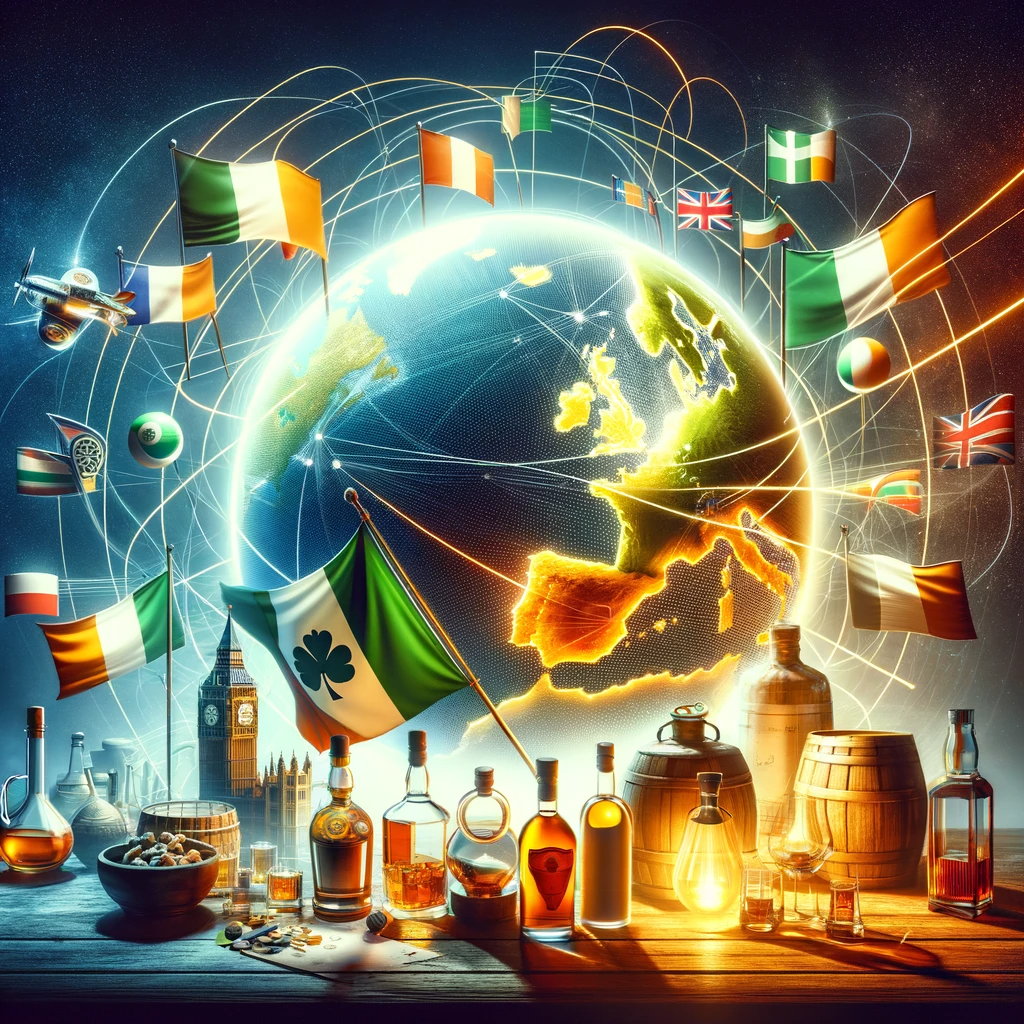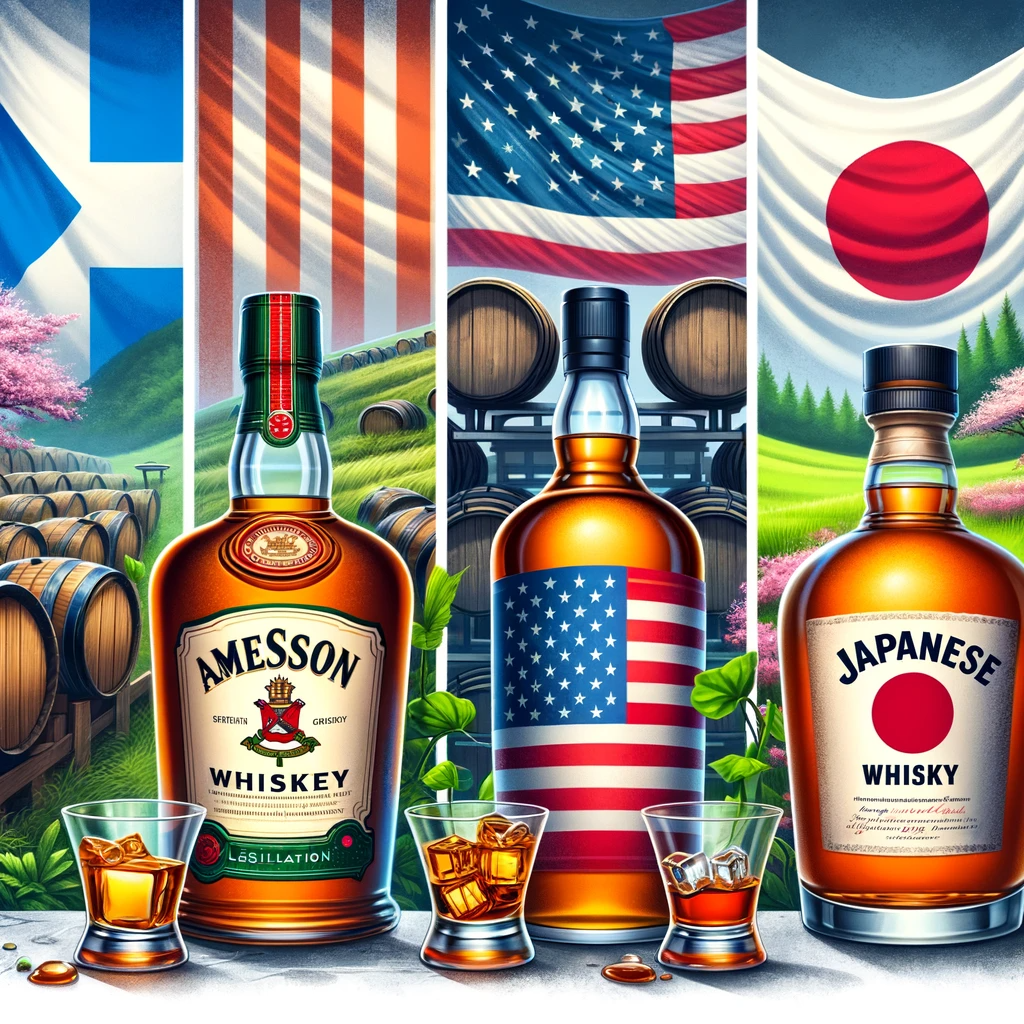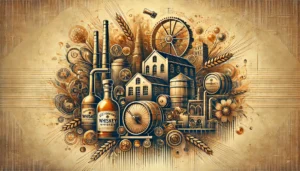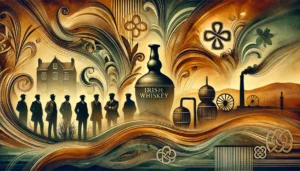The Irish Whiskey Act of 1980
Irish whiskey, with its rich heritage and unique production methods, has long held a revered place in the world of spirits. The journey of this beloved drink, characterised by its smooth, complex flavours, has been shaped by centuries of tradition and innovation. A pivotal moment in this journey was the enactment of the Irish Whiskey Act of 1980, a legislation that would define and protect the authenticity and quality of Irish whiskey on a global stage. This Act not only codified the production practices but also set the stage for a resurgence in the popularity and prestige of Irish whiskey. In this article, we delve into the depths of this significant legislation, exploring its contents, impacts, and the enduring legacy it has left on the whiskey industry. From the distilleries of Ireland to the glasses of connoisseurs worldwide, the Irish Whiskey Act of 1980 has been instrumental in crafting the narrative of this iconic spirit.
Introduction to Irish Whiskey and the 1980 Act
Irish whiskey, with its distinctive character and rich history, has long been a symbol of Ireland’s cultural heritage. Known for its smoothness and variety of styles, Irish whiskey’s journey has been shaped by centuries of craft and tradition. A crucial chapter in this journey was written with the Irish Whiskey Act of 1980, a landmark legislation that not only codified the standards for whiskey production in Ireland but also marked a new era in the industry’s global presence.

A Journey through Time
The story of Irish whiskey is one of resilience and revival. Dating back to the 12th century, it is believed to be one of the earliest distilled drinks in Europe. Over the centuries, Irish whiskey evolved, facing challenges like the Irish War of Independence, Prohibition in the United States, and global economic crises. However, its spirit remained unbroken. By the late 20th century, the industry realised the need for a formal definition and protection of their heritage product. This led to the establishment of the Irish Whiskey Act of 1980.
Defining Irish Whiskey
Before the 1980 Act, there was no legal standard for what could be called ‘Irish whiskey’. The Act provided a much-needed framework, defining Irish whiskey as whiskey distilled in Ireland from a mash of malted cereals with or without whole grains of other cereals, aged in wooden casks for a minimum of three years. It also laid down guidelines for labelling and marketing, ensuring authenticity and quality.
Revival of the Industry
The Act played a pivotal role in reviving the Irish whiskey industry. By setting strict production standards, it ensured a consistent, high-quality product that appealed to both traditional whiskey enthusiasts and new consumers worldwide. This era saw the emergence of new distilleries and a resurgence in global interest and respect for Irish whiskey.
Cultural and Economic Impact
The enactment of the Irish Whiskey Act of 1980 had a significant cultural and economic impact. It not only preserved the traditional methods of whiskey production but also promoted innovation within the bounds of authenticity. Irish whiskey became a symbol of Irish culture and heritage, contributing significantly to the country’s economy through increased exports and tourism.
Legacy and Moving Forward
Today, the legacy of the Irish Whiskey Act of 1980 is evident in the global acclaim and growing popularity of Irish whiskey. It set the stage for the modern renaissance of the industry, with Irish whiskey being one of the fastest-growing spirit categories in the world. The Act has ensured that Irish whiskey is not just a drink but a representation of Ireland’s history, culture, and craftsmanship.
Key Provisions of the Irish Whiskey Act of 1980
The Irish Whiskey Act of 1980 was a monumental step in the history of Irish whiskey, setting the stage for a global resurgence in its popularity. This legislation not only standardised the production of Irish whiskey but also protected its heritage and authenticity. Here, we delve into the key provisions of this act and how they have shaped the industry.

Defining Irish Whiskey
The core of the Act was to define what constitutes ‘Irish whiskey’. Under the law, Irish whiskey must be distilled and aged in the Republic of Ireland or Northern Ireland. It must be made from a yeast-fermented mash of cereal grains, distilled at an alcohol by volume (ABV) of less than 94.8%, and aged in wooden casks for at least three years. This definition ensured the preservation of traditional production methods while allowing for innovation within these parameters.
Aging Process and Quality Control
A crucial aspect of the Act was the stipulation on ageing. Irish whiskey must age for a minimum of three years in wooden casks, a process that imparts distinct flavours and character to the spirit. This ageing must occur on the island of Ireland, ensuring that the climatic and environmental factors contributing to the whiskey’s maturation are authentically Irish. The Act also mandated strict quality control measures to guarantee the integrity of the final product.
Labelling Standards and Geographical Indications
The Act introduced strict labelling standards, requiring that any whiskey labelled as ‘Irish whiskey’ strictly adhere to the defined production and ageing processes. This was vital in preventing mislabeling and maintaining consumer trust. Additionally, the Act recognized geographical indications, protecting the term ‘Irish whiskey’ globally and ensuring that only whiskey produced in Ireland could bear this name.
Impact on Distilleries and Producers
The Irish Whiskey Act of 1980 had a significant impact on distilleries and producers. It required them to adapt their production methods to comply with the new legal standards. This led to improvements in quality control, production processes, and overall product consistency. The Act also opened doors for new distilleries, fostering a competitive yet collaborative industry environment.
Preserving Tradition and Embracing Innovation
Perhaps the most remarkable aspect of the Act was its balance between tradition and innovation. While it preserved the centuries-old methods of Irish whiskey production, it also allowed for creativity within those boundaries. This has led to the emergence of a diverse range of Irish whiskey styles, each with its unique flavour profile, yet all adhering to the high standards set by the Act.
Impact on the Irish Whiskey Industry
The Irish Whiskey Act of 1980 played a transformative role in shaping the Irish whiskey industry, both within Ireland and on the global stage. This legislation not only reinforced the quality and authenticity of Irish whiskey but also paved the way for its international acclaim and commercial success.

Revitalising the Industry
Prior to the Act, the Irish whiskey industry was experiencing a decline, with a dwindling number of distilleries and decreasing global market share. The standardisation and protection provided by the Act served as a catalyst for revival. It reassured consumers of the quality and authenticity of Irish whiskey, leading to a renewed interest and a surge in demand. This resurgence was not just limited to traditional markets but also extended to new and emerging markets worldwide.
Expanding Global Reach
The Act’s emphasis on quality and authenticity had a ripple effect across the globe. Irish whiskey began to be perceived as a premium product, leading to increased exports. Distilleries started exploring new markets, and Irish whiskey found a place in countries far beyond its traditional strongholds. The global footprint of Irish whiskey expanded significantly, with a marked increase in its presence in the United States, Europe, and even in Asia.
Innovation and Diversification
One of the most significant impacts of the Act was the encouragement of innovation within the industry. While maintaining the traditional methods of production, distilleries began experimenting with different ageing processes, blending techniques, and flavour profiles. This led to a diversification of products, with a range of Irish whiskeys catering to varied tastes and preferences. The introduction of single malts, single pot stills, and blended whiskeys enriched the Irish whiskey portfolio, making it more appealing to a broader audience.
Cultural and Tourism Boost
The Act also had a cultural impact, reaffirming Irish whiskey’s position as a symbol of Irish heritage. It spurred the growth of whiskey tourism in Ireland, with an increasing number of visitors drawn to whiskey distillery tours and tasting experiences. This not only boosted the local economy but also helped in spreading Irish culture and traditions globally.
Industry Growth and Future Prospects
The Irish Whiskey Act of 1980 laid the foundation for a robust and dynamic industry. The last few decades have seen a steady growth in the number of distilleries, with both established players expanding their operations and new entrants bringing fresh perspectives. The industry has shown resilience and adaptability, with projections indicating continued growth and innovation in the coming years.
Comparative Analysis with Other Whiskey Legislation
The Irish Whiskey Act of 1980 was a defining moment in the world of spirits, setting a precedent for whiskey legislation globally. To fully appreciate its significance, it is enlightening to compare it with whiskey legislation in other prominent whiskey-producing countries: Scotland, the United States, and Japan. Each of these countries has its own set of laws and traditions that shape the identity and quality of their whiskey.

Scotland: Scotch Whisky Regulations
Scotland, known for its Scotch whisky, has regulations that mirror the dedication to tradition seen in Ireland. The Scotch Whisky Regulations of 2009 define Scotch whisky’s production, requiring it to be distilled and aged in Scotland for at least three years in oak barrels. Similar to Irish whiskey, Scotch must retain the flavours derived from its raw materials and maturation, ensuring the authenticity of the product.
United States: Bourbon and American Whiskey Standards
In the United States, the production of bourbon and other American whiskeys is governed by specific criteria. Bourbon, for instance, must be made from a mash bill containing at least 51% corn and aged in new charred oak containers. This contrasts with Irish whiskey, which has no grain composition requirement and allows for the use of previously used barrels. These distinctions give bourbon its unique character, differentiating it from its Irish counterpart.
Japan: The Ascent of Japanese Whisky
Japanese whisky, though a relatively newer player in the global whiskey scene, has made a significant impact. While Japan does not have as stringent legal definitions for whisky as Ireland or Scotland, its producers often adhere to Scottish production methods. The emphasis in Japan is on precision and innovation, leading to a diverse range of styles and flavours.
Shared Principles and Unique Identities
Despite differences in legislation and production methods, there is a shared principle among these countries: a commitment to quality and a deep respect for tradition. Irish, Scotch, American, and Japanese whiskeys all have distinct identities, shaped by their respective laws and cultural heritage. The Irish Whiskey Act of 1980 plays a crucial role in this global tapestry, ensuring the preservation and promotion of Ireland’s whiskey-making tradition.
Conclusion: A World of Whiskey United by Legislation
This comparative analysis highlights the diverse approaches to whiskey legislation across the world. Each country’s laws reflect its unique history and tradition in whiskey making. The Irish Whiskey Act of 1980, with its focus on authenticity and quality, stands as a testament to Ireland’s dedication to preserving its whiskey heritage while adapting to the demands of a global market.
The Legacy and Future of Irish Whiskey Post-1980
The Irish Whiskey Act of 1980 was more than just legislation; it was a catalyst that sparked a renaissance in Irish whiskey production. Its impact has been profound, shaping not only the industry’s present but also laying a foundation for its future. As we look forward, it’s clear that the legacy of this Act will continue to influence the path of Irish whiskey.

Preserving Heritage, Embracing the Future
One of the most enduring legacies of the Act is the preservation of Irish whiskey’s heritage. By defining production methods and ageing requirements, it protected the authenticity of Irish whiskey, ensuring that future generations would be able to enjoy and appreciate this traditional spirit. At the same time, the Act has not stifled innovation. Distilleries have been experimenting with new techniques and flavours while staying true to the spirit of the law, leading to an exciting and diverse range of Irish whiskeys.
The Rise of Craft Distilleries
A significant development in recent years has been the rise of craft distilleries in Ireland. Empowered by the Act’s emphasis on quality and authenticity, these small-scale producers are exploring unique blends and methods, contributing to a vibrant and dynamic industry. This movement is not only about producing whiskey; it’s about telling stories, each bottle a reflection of the local culture, history, and environment.
Global Expansion and Recognition
The global footprint of Irish whiskey has expanded dramatically since 1980. It is now one of the fastest-growing spirit categories worldwide, with increasing demand in markets like the United States, Europe, and Asia. This global recognition is a testament to the quality standards set by the Act, which have elevated Irish whiskey to a premium status in the world of spirits.
Sustainability and Innovation
Looking to the future, sustainability is a key focus for the Irish whiskey industry. Distilleries are investing in environmentally friendly practices, from energy-efficient production methods to sustainable sourcing of ingredients. Innovation is also at the forefront, with new technologies being explored to enhance production and ageing processes. This blend of tradition and innovation promises an exciting future for Irish whiskey.
A Toast to the Future
As we reflect on the past and look to the future, it is clear that the Irish Whiskey Act of 1980 has been instrumental in shaping the destiny of Irish whiskey. It has not only preserved a centuries-old tradition but has also set the stage for innovation and growth. The future of Irish whiskey is bright, filled with the promise of new flavours, experiences, and stories, all rooted in the rich heritage that the Act so carefully protected.








Be First to Comment